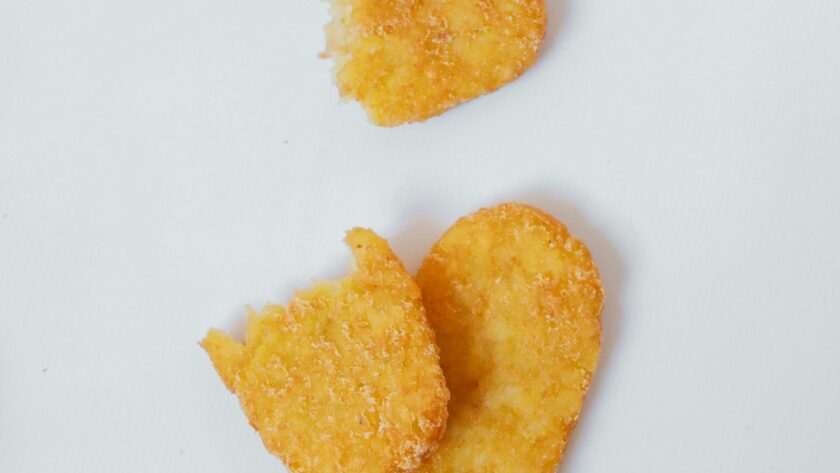Hash browns, a popular breakfast dish enjoyed globally, are particularly loved for their crispy texture and savory flavor. Made primarily from potatoes, it is simple but versatile, often cooked with butter or oil to achieve a golden, crispy exterior. While traditionally served as a breakfast side, they are also a beloved comfort food.
For health-conscious individuals or those focusing on calorie control, understanding the calorie content and nutritional profile of it can help you enjoy them without compromising your fitness goals. In this guide, we will break down the calorie content of the basic ingredients and explore ways to make it a healthier option while still indulging in their delicious flavor.
Ingredients and Calorie Breakdown
Here’s a closer look at the traditional ingredients used in making it and their calorie content:
1. Potatoes (1 medium / 150g)
- Calories: ~110 calories
- Protein: 3g
- Fat: 0g
- Carbohydrates: 26g
- Fiber: 2g
Potatoes are the primary ingredient in this recipe and are naturally low in fat but rich in carbohydrates. They also contain essential nutrients such as potassium and vitamin C, making them a nutritious base for the dish.
2. Butter or Oil (1 tablespoon / 15ml)
- Calories: ~120 calories
- Protein: 0g
- Fat: 14g
- Carbohydrates: 0g
- Fiber: 0g
Butter or oil is commonly used to fry the potatoes and achieve that signature crispy texture. While it adds flavor, it significantly increases the calorie count. For a healthier option, you can use a smaller amount of oil or switch to a cooking spray to reduce the fat content.
3. Salt (1/4 teaspoon / 1.5g)
- Calories: 0 calories
- Protein: 0g
- Fat: 0g
- Carbohydrates: 0g
- Fiber: 0g
Salt enhances the flavor of this recipe but should be used sparingly, especially for those watching their sodium intake.
4. Pepper (1/4 teaspoon / 0.5g)
- Calories: 1 calorie
- Protein: 0g
- Fat: 0g
- Carbohydrates: 0.2g
- Fiber: 0.1g
Pepper adds a subtle spice to the dish without adding any significant calories.
Total Calorie Estimate for Traditional Hash Browns
The total calorie count for a serving of traditional hash browns (one medium potato fried in 1 tablespoon of oil or butter) is approximately 230-240 calories. Here’s the breakdown:
- Potatoes: 110 calories
- Butter or Oil: 120 calories
- Salt: 0 calories
- Pepper: 1 calorie
While hash browns are relatively calorie-dense due to the frying process, you can make adjustments to the recipe to lower the calorie content without sacrificing flavor.

Healthier Alternatives
If you’re mindful of your calorie intake but don’t want to give up hash browns, here are some tips for making healthier versions:
1. Use Less Oil or Butter
One of the easiest ways to reduce the calorie content of hash browns is by minimizing the amount of oil or butter used. Consider using half a tablespoon of oil or butter instead of a full tablespoon, which will cut down the calories by about 60.
2. Opt for Cooking Spray
Instead of frying hash browns in oil or butter, use a non-stick cooking spray. This can drastically reduce the calorie count without compromising the crispy texture. You can also bake the hash browns in the oven for an even lower-calorie option.
3. Add Vegetables
To boost the nutritional value and lower the calorie density, consider mixing grated vegetables like carrots, zucchini, or onions into your hash browns. These vegetables add fiber, vitamins, and minerals while keeping the dish light and flavorful.
4. Use Sweet Potatoes
For a nutrient-dense twist, substitute regular potatoes with sweet potatoes. Sweet potatoes are packed with vitamins A and C and have a slightly lower glycemic index, making them a healthier option. However, they will add a slightly sweet flavor to your hash browns, which can be a welcome change for many.
Nutritional Benefits
While hash browns are often viewed as an indulgent comfort food, they do offer some nutritional benefits:
1. High in Carbohydrates
Potatoes are an excellent source of complex carbohydrates, providing energy to fuel your day. This makes hash browns a good choice for breakfast, especially if paired with protein-rich foods like eggs or lean meats.
2. Rich in Potassium
Potatoes are one of the best natural sources of potassium, which is essential for maintaining healthy blood pressure levels and proper muscle function.
3. Fiber Content
Although potatoes aren’t high in fiber, they still contribute a small amount to your daily intake. Fiber helps regulate digestion and keeps you feeling full for longer, which can aid in weight management.
Portion Control: The Key to Enjoying Hash Browns
Portion control is crucial when consuming calorie-dense foods like this. Stick to a moderate serving size (about one medium potato or less) to keep your calorie intake in check. Pairing it with a source of protein, such as scrambled eggs or Greek yogurt, can help balance your meal and keep you satisfied.
If you’re dining out, be mindful of restaurant portions, as it can sometimes be served in large quantities with additional oils and fats. Requesting baked or grilled versions, or asking for less oil during cooking, can help manage calories.
Conclusion: Enjoying Hash Browns Mindfully
Hash browns can be part of a healthy, balanced diet if prepared mindfully. By understanding the calorie content of the ingredients and making a few simple swaps, you can enjoy this crispy breakfast favorite without derailing your nutritional goals. Whether you’re frying them up traditionally or opting for a lighter baked version, it ia a versatile dish that can easily fit into a health-conscious lifestyle.
Info Box
For detailed calorie counts and more nutritional insights, visit our page for a wide range of delicious and nutritious options.
FAQ: Hash Browns and Health
Q1: How can I make hash browns healthier?
A: To make it healthier, reduce the amount of oil or butter, use a cooking spray, bake them instead of frying, or mix in vegetables like zucchini and carrots for added nutrition.
Q2: Are hash browns high in calories?
A: Traditional hash browns can be calorie-dense due to the frying process, with about 230-240 calories per serving. However, using less oil or opting for baked versions can reduce the calorie content.
Q3: Can I eat hash browns while trying to lose weight?
A: Yes, hash browns can fit into a weight loss plan if consumed in moderation. Be mindful of portion sizes and cooking methods to avoid excess calories.
Q4: What are the best substitutes for potatoes in hash browns?
A: Sweet potatoes, carrots, or zucchini can be used as healthier substitutes for regular potatoes in hash browns. These alternatives offer different flavors and additional nutrients.



